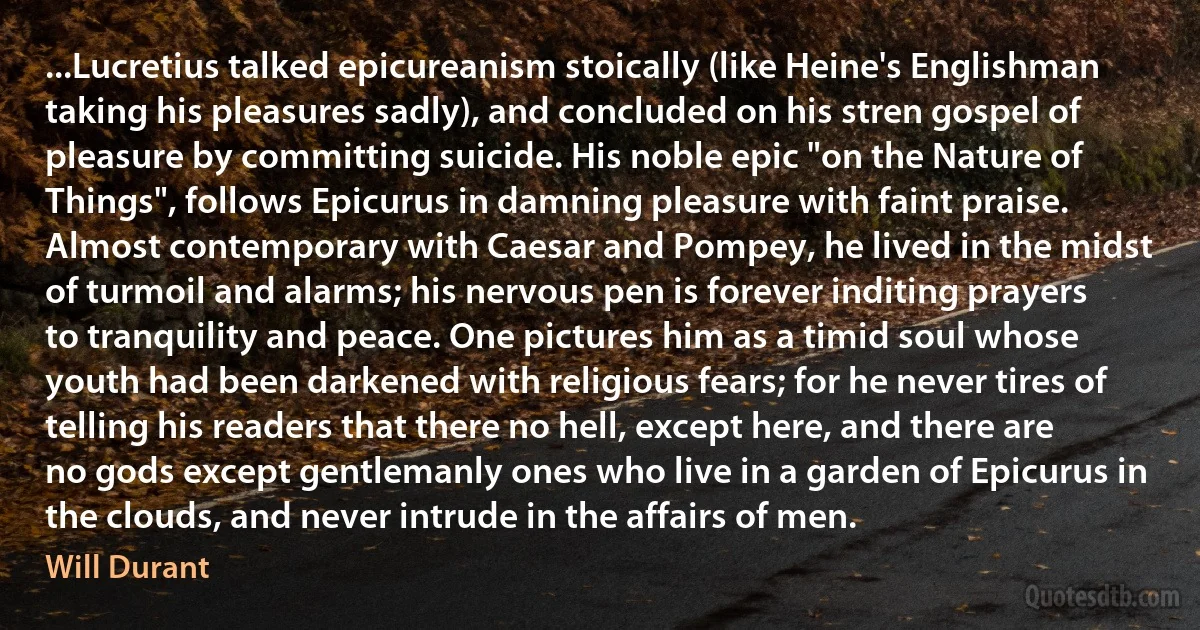
...Lucretius talked epicureanism stoically (like Heine's Englishman taking his pleasures sadly), and concluded on his stren gospel of pleasure by committing suicide. His noble epic "on the Nature of Things", follows Epicurus in damning pleasure with faint praise. Almost contemporary with Caesar and Pompey, he lived in the midst of turmoil and alarms; his nervous pen is forever inditing prayers to tranquility and peace. One pictures him as a timid soul whose youth had been darkened with religious fears; for he never tires of telling his readers that there no hell, except here, and there are no gods except gentlemanly ones who live in a garden of Epicurus in the clouds, and never intrude in the affairs of men.
Will DurantRelated topics
almost contemporary damning epic forever garden hell men live midst nature noble ones peace pen pleasure praise soul taking telling youth affairs things Epicurus gods PompeyRelated quotes
There are some people whose dread of human beings is so morbid that they reach a point where they yearn to see with their own eyes monsters of ever more horrible shapes. And the more nervous they are-the quicker to take fright-the more violent they pray that every storm will be ... Painters who have had this mentality, after repeated wounds and intimidations at the hands of the apparitions called human beings, have often come to believe in phantasms-they plainly saw monsters in broad daylight, in the midst of nature. And they did not fob people off with clowning; they did their best to depict these monsters just as they had appeared. Takeichi was right: they had dared to paint pictures of devils.

Osamu Dazai
His Majesty [emperor Charles V], [in his court in Augsburg] sent for me. After the usual courtesies and examination of the pictures which I have brought, he asked for news of you.... I replied that at Venice, in Rome and in all Italy the public assumed that his Holiness [the new Pope], was well minded to make you.. [Cardinal] upon which Caesar [= Charles V] showed signs of pleasure in his face, saying he would greatly rejoice at such an event, which could not fail to please you, and so, dear brother [= close friend], I have done for you such service as I owe to a friend of your standing.... not a day passes but the Duke of Alva speaks to me of the 'divine Aretini', because he loves you so much..

Titian
Of the nature of Death and the Dead we may enumerate twelve kinds. First there are those who become new gods, for whom new universes are born. Second those who praise. Third those who fight as soldiers in the unending war with evil. Fourth those who amuse themselves among flowers and sweet springs with sports. Fifth those who dwell in gardens of bliss, or are tortured. Sixth those who continue as in life. Seventh those who turn the wheel of the universe. Eighth those who find in their graves their mothers' wombs and in one life circle forever. Ninth ghosts. Tenth those born again as men in their grandsons' time. Eleventh those who return as beasts or trees. And last those who sleep.

Gene Wolfe
To experience and live out a harmony with the world, in a manner quite different from that of everyday life - this, we have said, is the meaning of "festival." But no more intense harmony with the world can be thought of than that of "Praise of God," the worship of the Creator of this world. Now, as I have often experienced, this statement is often received with a mixture of discomfort and various other feelings, but its truth cannot be denied. The most festive festival that can be celebrated is religious worship or "cult," and there is no festival that does not get its life from such worship or does not actually derive its origin from this. There is no worship "without the gods," whether it be mardi gras or a wedding.

Josef Pieper
To me, there is no doctrine so infinitely absurd as the idea that this life is a probationary state-that the few moments spent here decide the fate of a human soul forever. Nothing can be conceived more merciless, more unjust. I am doing all I can to destroy that doctrine. I want, if possible, to get the shadow of hell from the human heart. Why has any life been a failure here? If God is a being of infinite wisdom and kindness, why does he make failures? What excuse has infinite wisdom for peopling the world with savages? Why should one feel grateful to God for having made him with a poor, weak and diseased brain; for having allowed him to be the heir of consumption, of scrofula, or of insanity? Why should one thank God, who lived and died a slave.

Robert G. Ingersoll
